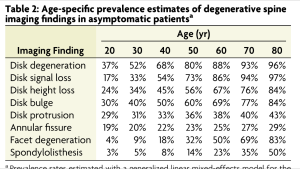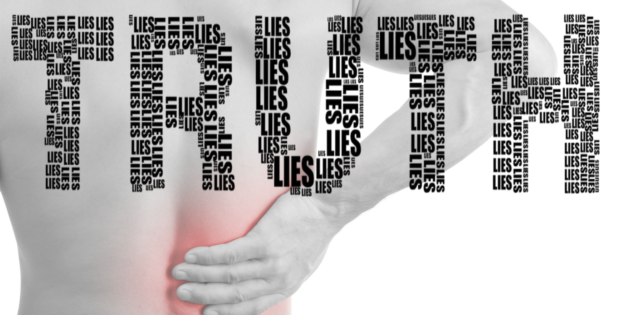What You NEED To Know About How To Interpret Your Back MRI Results
So you just had an MRI of your lumbar spine (lower back) and you went to see the doctor for the results or tried to read the MRI results yourself. Quickly you became confused, overwhelmed, and/or anxious reading all these “bad” things about your back. What should you think of these really big, negative sounding words like degenerative, spondylosis (the fancy term for arthritis in the spine), narrowing, etc?
Quick answer…….not much at all.
It is estimated that about 80% of people will experience low back pain at some point in their lives and many of these people will see a physician who will recommend they get an MRI. Unfortunately, many of these MRIs are completely UNNECESSARY and could potentially do more harm than good when it comes to getting rid of your pain. And the MRI results could lead the person down the road of surgery or injections or painkillers….when those might not even be necessary.
I know how frustrating or confusing that might sound to hear and the reason I wrote this article is to help you have a better understanding of your MRI results and what they mean to your treatment plan.
A high percentage of low back pain is non-specific – meaning healthcare professionals cannot pinpoint one specific structure to the cause of your pain. Usually the cause is a combination of multiple different factors – mobility of the surrounding joints (hips, thoracic spine), training error, poor mechanics, personal experience/expectations of back pain – just to name a few.
So if there isn’t one specific structure that is causing your low back pain, why does your MRI show SO MANY things wrong with your back!?
Multiple studies have shown a large amount of coincidental findings on spinal MRIs (also present with other body parts too, but we’ll focus on the spine for the sake of this article). Here is what some of them found:
- about 40% of asymptomatic people (people without any pain) have bulging discs
- about 50% of all CT scans and 33% of MRIs of the low back are NOT NECESSARY (and I think those numbers should be even higher)
- the increased use of unnecessary imaging may actually lead to less favorable results
“…overuse of MRI for patients with low back pain is related to an increased rate of surgical procedures that have not consistently been shown to significantly reduce painful symptoms and improve daily function.”
- here is a table that summarizes the MRI results in people WITHOUT any back pain:

When a physician orders an MRI and they see all these “abnormalities,” they assume that is the cause of your pain and typically suggest more invasive procedures like injections or surgery. It shouldn’t be that much of a surprise to you that injections and surgeries have mixed results if you realize the reason for doing them is based on a coincidental MRI finding.
Simply put – just because you are in pain and your MRI shows “abnormalities” doesn’t mean you should attribute the cause of your pain to those “abnormalities” – they very well could have been there for years and you just had no idea.
I do have to make this important point though – there are still some instances when an MRI of the lumbar spine is completely warranted and should be done promptly:
- rapidly progressing neurologic symptoms (weakness and/or numbness) in leg(s)
- sudden bowel/bladder dysfunction or incontinence
- when a more serious non-orthopedic condition is suspected (tumor, infection, cancer, etc)
What I Tell My Patients Who Want To Know More About Their MRI Results
When I treat a patient for low back pain and they ask me about their MRI results, among the many things I talk about is what is mentioned in this article and I tell them to take the MRI results with a grain of salt.
I tell them that as physical therapists, we actually don’t care what the MRI says, rather we care about what you complain of, how your body moves, and what we can do to help – the MRI results don’t dictate or change our treatment plan. As I frequently tell my patients:
I DON’T TREAT SCANS, I TREAT PEOPLE
After having this discussion, many of these patients (admittedly not all – some get “attached” to their results and seem to wear them like a badge of honor) have immediate reductions in anxiety about the results and some even feel better – even though I haven’t even touched them yet.
Next time you speak with a healthcare professional and they recommend you get an MRI (for anything, not just your low back), ask them why they think it is necessary and how it will affect their treatment plan for you.
It could potentially save you time & money and lead to a quicker & better recovery.

